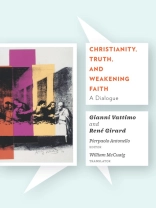The debate over the place of religion in secular, democratic societies dominates philosophical and intellectual discourse. These arguments often polarize around simplistic reductions, making efforts at reconciliation impossible. Yet more rational stances do exist, positions that broker a peace between relativism and religion in people’s public, private, and ethical lives.
Christianity, Truth, and Weakening Faith advances just such a dialogue, featuring the collaboration of two major philosophers known for their progressive approach to this issue. Seeking unity over difference, Gianni Vattimo and René Girard turn to Max Weber, Eric Auerbach, and Marcel Gauchet, among others, in their exploration of truth and liberty, relativism and faith, and the tensions of a world filled with new forms of religiously inspired violence.
Vattimo and Girard ultimately conclude that secularism and the involvement (or lack thereof) of religion in governance are, in essence, produced by Christianity. In other words, Christianity is ‘the religion of the exit from religion, ‘ and democracy, civil rights, the free market, and individual freedoms are all facilitated by Christian culture. Through an exchange that is both intimate and enlightening, Vattimo and Girard share their unparalleled insight into the relationships among religion, modernity, and the role of Christianity, especially as it exists in our multicultural world.
Table des matières
Note on the Text
Introduction, by Pierpaolo Antonello
1. Christianity and Modernity, by Gianni Vattimo and René Girard
2. Faith and Relativism, by Gianni Vattimo and René Girard
3. Hermeneutics, Authority, Tradition, by Gianni Vattimo and René Girard
4. Heidegger and Girard: Kénosis and the End of Metaphysics, by Gianni Vattimo
5. Not Just Interpretations, There Are Facts, Too, by René Girard
Notes
Bibliography
A propos de l’auteur
Gianni Vattimo is emeritus professor of philosophy at the University of Turin and a member of the European Parliament. His books with Columbia University Press are Christianity, Truth, and Weakening Faith: A Dialogue (with René Girard), Not Being God: A Collaborative Autobiography, Art’s Claim to Truth, After the Death of God, Dialogue with Nietzsche, The Future of Religion (with Richard Rorty), Nihilism and Emancipation: Ethics, Politics, and the Law, and After Christianity.René Girard held the position of Andrew B. Hammond Professor of French Language, Literature, and Civilization at Stanford University until his retirement in 1995. He is the cofounder of the Colloquium on Violence and Religion, which meets annually to discuss issues in mimetic theory, scapegoating, violence, and religion, and his books include Violence and the Sacred, Things Hidden Since the Foundation of the World, and A Theatre of Envy. In 2005, Girard was elected to L’Académie française, the highest tribute for a French intellectual.Pierpaolo Antonello is senior university lecturer in Italian at St. John’s College, Cambridge University William Mc Cuaig is most recently the translator of Vattimo’s Not Being God.







![Couverture du Brian Schrag & Julisa Rowe: Community Arts for God's Purposes [Chinese] 貼近神心意的社群藝術 Couverture du Brian Schrag & Julisa Rowe: Community Arts for God's Purposes [Chinese] 貼近神心意的社群藝術](https://static.worldofdigitals.com/thumb_webp/740/9781645083740.webp)




